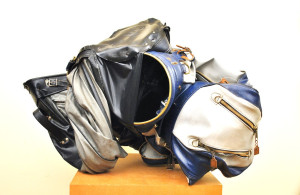
Blue Cloud, 2014.
About ‘Skinned’:
SKINNED – February 2014…New pieces literally wrestled into shape. Stubborn objects. There is so much resistance. Each step is a physical challenge. These bags were made well and not manufactured to come apart, especially not to be pulled apart, twisted and manipulated into shapes that are counter-intuitive to their nature. Previous pieces had the same physicality within the process but I began the pieces by performing an autopsy – cutting the bag with a blade from ‘throat to pelvis’ and pulling apart the chest cavity – at least that’s how it feels… The hooded pieces were always laying ‘face up’ as though on a slab and the process continued as though some form of autopsy or examination was being performed. The work had broken away from the early decorative state. It began establishing a very different tone. As I write from the studio today, 2/11/2014 the work has matured beyond any previous state or expectation. I finally know how to play the instrument I was given. Onward.
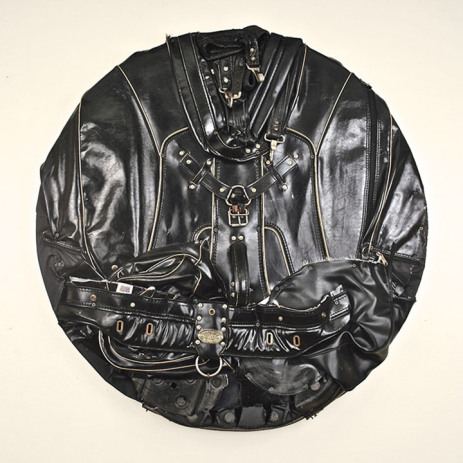 Black Tondo, 2014.
Black Tondo, 2014.
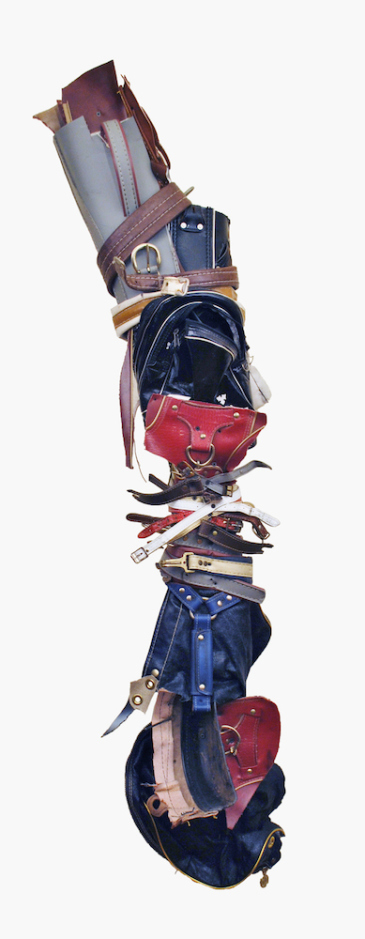 Cutie, 2014.
Cutie, 2014.
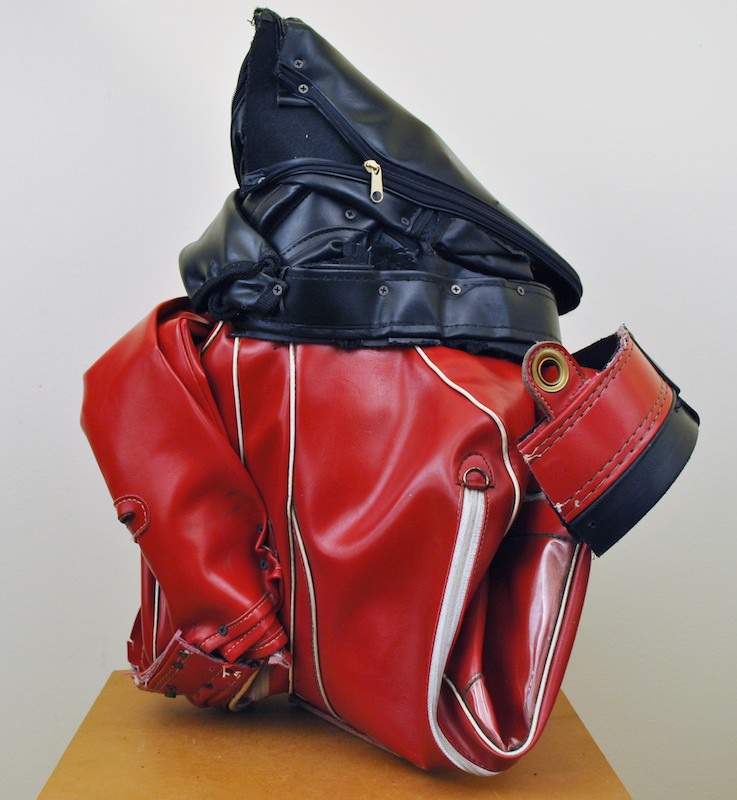 Heart of Darkness, 2014.
Heart of Darkness, 2014.
About:
Taking Some Hacks with Charles McGill
Play them as they lie
R. C. Baker Village Voice, Apr 17 2013
A serious golfer, artist Charles McGill knows from bad lies. In 1997, he photographed himself playing through a vacant lot in Harlem, firing off elegant fades amid blowing trash, shattered bricks, and rusting rebar. A few years later, his job at the Westchester Country Club inspired a pitch for a line of golf equipment aimed at a new generation of black activists he considered a little too comfortable with the status quo: “Why be on the front line when you can be on the front nine? Introducing the new Nigger 2000. The golf ball for revolutionaries who just don’t have the time.”
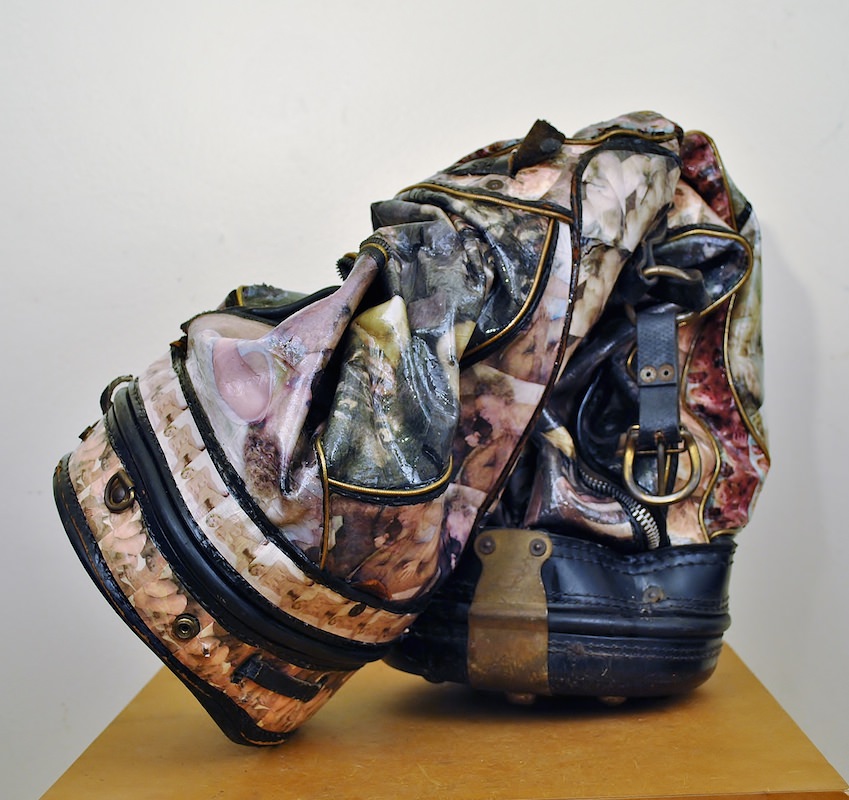 The History of Sex and Race, 2014.
The History of Sex and Race, 2014.
McGill (b. 1964) is fully aware that as a black man he’s very much in the minority on the greens, even in the epoch of Tiger Woods. Surrounded by his new work—large, vibrant collages fabricated from deconstructed golf bags—McGill ruefully relates to the Voice his view of current black leadership: “I couldn’t imagine Malcolm X postponing a rally in Harlem because he had a tee-time in Westchester. But it seems as though politicians and celebrities nowadays would easily put that off to get 18 holes in.”
Judging by this large body of powerful work, McGill hasn’t been spending much time on the links of late. He has brought years of training as a painter to bear on such collages as the 4 x 4 foot Troubled Man (2012), in which a slash of magenta balances a rich brown field like a de Kooning brushstroke; jutting, pointy rain hoods (designed to keep golf clubs dry) recall Philip Guston’s galumphing Klansmen; and copious zippers, straps, and leather handles summon all manner of bondage and servitude. The slyly titled Blue Menace (2012) can easily be read as a clown Klavern, with a white bag doing double duty as a hooded straightjacket. A central, sky-blue figure sports a literal pair of balls, adding sexual threat (and serious laughs) to the composition while recalling Jasper Johns’s Painting with Two Balls (1960), that gay artist’s spattered riposte to the machismo of the abstract expressionists. Throughout, there are whiffs of the anonymous cowardice of the Klan and the toadying conformity of the country club.
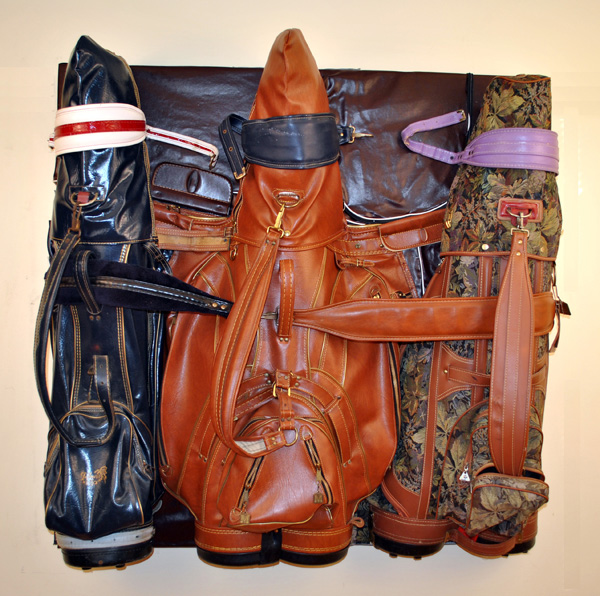 Defiant Ones, 2011.
Defiant Ones, 2011.
Antecedents and allusions drop away in the face of McGill’s serious formal prowess, however. In 2013’s Sky Shaman, a rigid bouquet of black plastic tubes, used to keep clubs organized inside those pliable bags, is tightly cinched by a ragged girdle of buckles; a pin-headed white-and-tan figure looms out of Night of Mischief, zippers gaping, flanked by sentinels who fade into a background as darkly luminous as the sky around a harvest moon.
McGill buys his materials at thrift shops, and joked to us that after scoring a particularly huge haul in Chicago, he was “hoping I’d get profiled,” so he could open the trunk for the cops and reveal 24 used golf bags rather than contraband. His tone became serious when he recounted the tale of a white cop following him for two miles in upstate New York before finally pulling him over for “swerving.” When McGill matter-of-factly pointed out that this seemed a classic case of “driving while black,” the trooper deadpanned, “My wife is black.”
You betcha. When we do finally arrive at the Shangri-La of a race-blind society—however many generations it takes Republicans to recover from failing to deny Obama a second term—we’ll still be admiring McGill’s complex and unpredictably graceful constructions.
